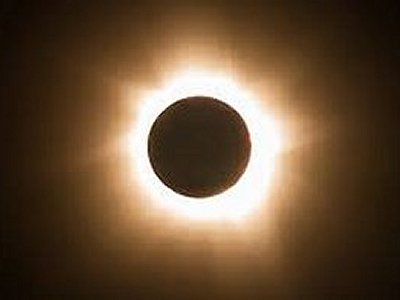
WHEN THE SUN TURNS TO BLACK
A solar eclipse says a lot about the kind of world we have made, but even more about the God of creation
On March 20, 2015 the sun will be extinguished over the UK. It won’t be a total eclipse, as on August 11, 1999, but should be sufficient to bring the country to a halt for a few minutes. We were driving on a German autobahn in 1999 when the cars came slowly to a halt and people left their vehicles to gather and stare in wonder at the scene, like an apocalyptic flash mob.
There are different takes on the experience. The anorak is fascinated by the data, like a cosmological John Motson. The scientist can tell you exactly why and how this is happening, drawing attention to overlooked detail. The mystic sees this as one giant, numinous experience to gorge on. The hysteric maintains it is the end of the world – or at least they used to.
An eclipse tells us a lot about the kind of world we have made. Throughout history, solar eclipses have caused momentary panic among populations. If you do not have the ability to anticipate an eclipse, it would look like the world is coming to an end, as the sun is the sustainer of life. If you believed the sun was to be worshipped, it would look like an attack of evil on the heart of goodness itself.
This being the age of science, key explanations will be provided, with footnotes referring to the primitive and credulous beliefs of previous civilisations. The dominance of a purely scientific world view has, by common consensus, led to an erosion of wonder and awe at creation, but this is being reclaimed and there is no better moment to celebrate this than during a solar eclipse.
An event like this invokes a desire to worship, even among materialists. It is a natural human response to an unusual phenomenon; it offers a sense of the enormity and complexity of the universe; of how big it is and how small we are and yet how God so loved the world that he sent his only Son to save it. We take the gift of the sun for granted; an eclipse reminds us not to.
In reading the Bible, we notice how significant the blotting out of the sun proves in the history of God’s dealings with the world. In Genesis, before he forms the earth, the narrative says that ‘darkness was over the face of the deep’; God’s first command was ‘let there be light’. Emerging light from the sun heralded the creation of the world. Later, as Jesus was dying on the cross, the Gospels say that darkness came over the whole land for three hours. The blotting out of the sun symbolised the moment of God’s redemption. The Easter story is faithfully represented by a solar eclipse, where the one true light is momentarily consumed by darkness, only to emerge triumphant shortly after.
In Revelation 6, the sun turns to black and the stars fall from the sky as a precursor of God’s final judgment on the world and a prefiguring of the new creation where God himself will be the light people live by. The extinguishing of the sun’s light is a defining moment in creation, redemption and revelation.
If you are able to stop and see this solar eclipse, do so. Sense the enormity of God’s creative power, recall how it describes the moment of our redemption and prefigures a world to come. And worship the God of our Lord Jesus Christ in a brief moment of transcendence.
POPULAR ARTICLES

Obama's Covert Wars
The use of drones is going to change warfare out of all recognition in the next decades.

Through A Glass Starkly
Images of traumatic incidents caught on mobile phone can be put to remarkable effect.

What Are British Values?
Is there a British identity and if so, what has shaped the values and institutions that form it?


